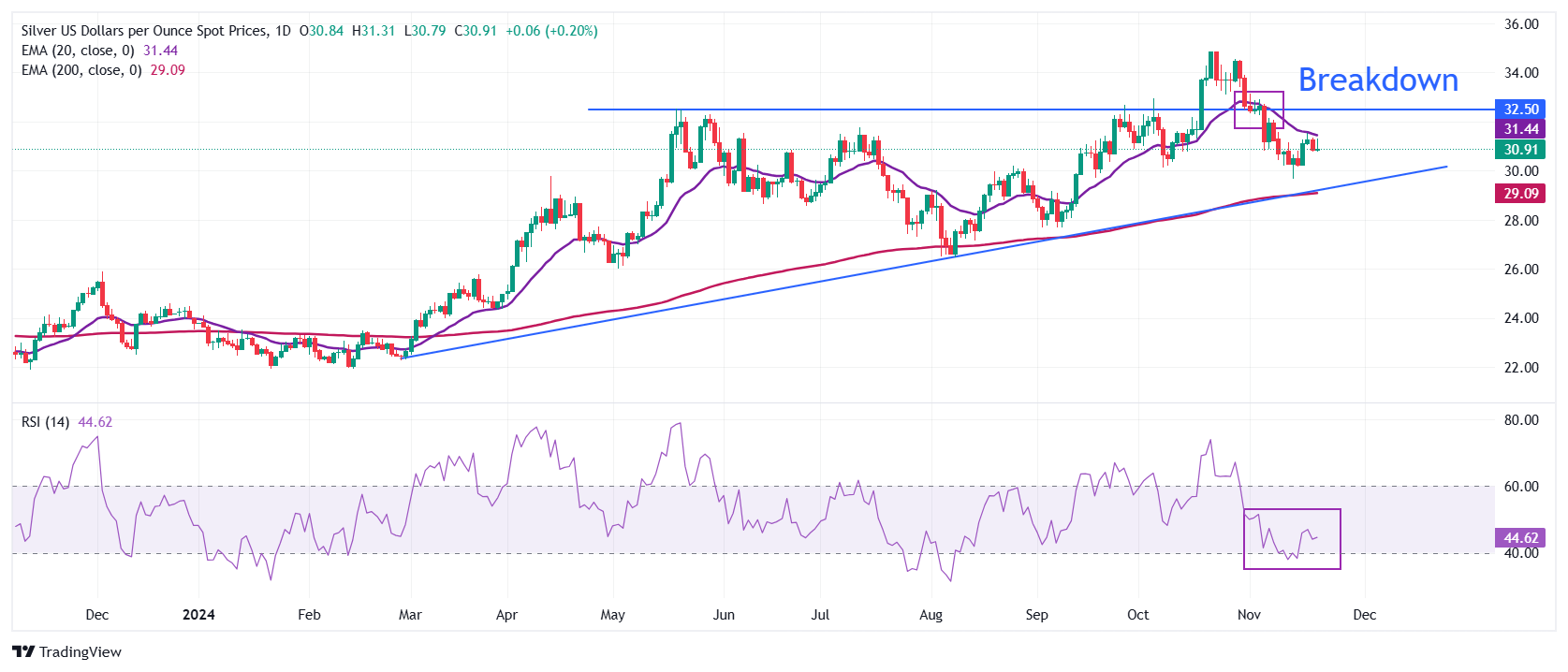Silver Price Forecast: XAG/USD rebounds above $31 as fears of escalation in Russia-Ukraine war
- Silver price recovers mildly above $31.00 on heightened geopolitical tensions.
- Ukraine launched UK-supplied missiles in Russia, resulting in a fresh escalation in the war.
- Investors await the flash US S&P Global PMI for November.
Silver price (XAG/USD) bounces back slightly above $31.00 in Thursday’s North American session after a corrective to near $30.80 on Wednesday. The white metal rebounds on fresh escalation in the Russia-Ukraine war, which forced investors to flee to safe-haven assets, such as Silver.
Geopolitical tensions renewed as Ukraine launched United Kingdom (UK)-supplied missiles into Russia, a day after it fired Army Tactical Missile System (ATACMS) provided by United States (US) President Joe Biden that fuelled risks of third world war.
Historically, the appeal of safe-haven assets, such as Silver, improves in times of uncertainty or heightened geopolitical risks.
The outlook of the Silver price remains uncertain as investors doubt whether the Federal Reserve (Fed) will cut interest rates again in the December meeting. The probability of the Fed to cut interest rates by 25 bps to 4.25%-4.50% in December has come down to 56% from 72% a week ago, according to the CME FedWatch tool.
Meanwhile, the US Dollar Index (DXY), which tracks the Greenback’s value against six major currencies, wobbles around 106.60. 10-year US Treasury yields hover around 4.40%.
Going forward, investors will focus on the preliminary S&P Global PMI data for November, which will be published on Friday. Economists expect the overall private sector activity to have improved.
Silver technical analysis
Silver price stays on track toward the upward-sloping trendline around $29.00, plotted from the February low of $22.30, which also coincides with the 200-day Exponential Moving Average (EMA). The white metal faces selling pressure near the 20-day EMA, which trades around $31.40.
The asset weakened after the breakdown of the horizontal support plotted from the May 21 high of $32.50.
The 14-day Relative Strength Index (RSI) slides to near 40.00. A bearish momentum will trigger if the RSI (14) sustains below the same.
Silver daily chart

Silver FAQs
Silver is a precious metal highly traded among investors. It has been historically used as a store of value and a medium of exchange. Although less popular than Gold, traders may turn to Silver to diversify their investment portfolio, for its intrinsic value or as a potential hedge during high-inflation periods. Investors can buy physical Silver, in coins or in bars, or trade it through vehicles such as Exchange Traded Funds, which track its price on international markets.
Silver prices can move due to a wide range of factors. Geopolitical instability or fears of a deep recession can make Silver price escalate due to its safe-haven status, although to a lesser extent than Gold's. As a yieldless asset, Silver tends to rise with lower interest rates. Its moves also depend on how the US Dollar (USD) behaves as the asset is priced in dollars (XAG/USD). A strong Dollar tends to keep the price of Silver at bay, whereas a weaker Dollar is likely to propel prices up. Other factors such as investment demand, mining supply – Silver is much more abundant than Gold – and recycling rates can also affect prices.
Silver is widely used in industry, particularly in sectors such as electronics or solar energy, as it has one of the highest electric conductivity of all metals – more than Copper and Gold. A surge in demand can increase prices, while a decline tends to lower them. Dynamics in the US, Chinese and Indian economies can also contribute to price swings: for the US and particularly China, their big industrial sectors use Silver in various processes; in India, consumers’ demand for the precious metal for jewellery also plays a key role in setting prices.
Silver prices tend to follow Gold's moves. When Gold prices rise, Silver typically follows suit, as their status as safe-haven assets is similar. The Gold/Silver ratio, which shows the number of ounces of Silver needed to equal the value of one ounce of Gold, may help to determine the relative valuation between both metals. Some investors may consider a high ratio as an indicator that Silver is undervalued, or Gold is overvalued. On the contrary, a low ratio might suggest that Gold is undervalued relative to Silver.


